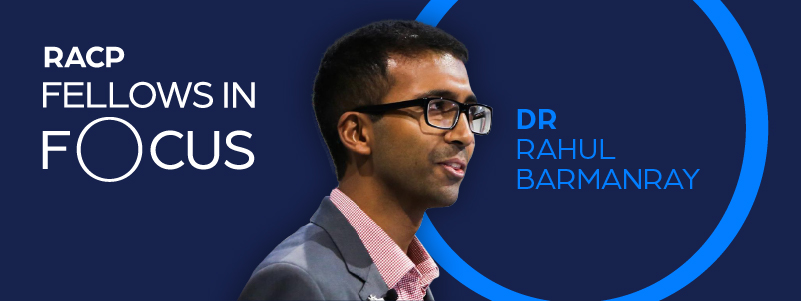RACP Fellows in Focus: Dr Rahul Barmanray
Date published:
06 Sep 2021

“I'm an endocrinologist, sub-specialising in diabetology,” said Dr Rahul Barmanray. Fresh from his win of the 2020 Australasian Diabetes Society President’s Clinical Young Investigator of the Year Award he explained, “The thing you aim for when you're a junior doctor is all these incredible consultants that can look at the patient at the end of the bed and make a diagnosis. You think, 'Wow. I want to be able to do that.' You witness their superpower and it seems like the sort of thing that you want to aspire to.”
“Being a specialist, as opposed to say a career medical officer or one of the other fields, allows you to look after patients to the utmost limits of medical science and medical knowledge. It's honestly humbling for a patient to put their trust in you. To expect that you know what you’re doing, that you’re going to be the one that can solve their problem and know that you have the confidence in yourself.”
Rahul is coming into his second year as a Fellow of the RACP and balancing a PhD with a Fellowship and full-time job is no easy task. When quizzed about the challenges he has faced he said, “Few doctors working at the moment would have had a greater challenge than COVID-19. The specific challenge that COVID-19 posed to me and my research team is that we are doing research using wifi-enabled glucose meters to pick up all glucose results, enabling us to find who has high and low blood glucose in real-time, remotely, so we can go and intervene. COVID-19 meant that we couldn't implement the system at anywhere near the speed that we wanted to, which meant that a whole lot of research got delayed.
“The challenge was not only wanting to implement the system so we could do the research, but if we were able to institute the system, then nurses and doctors wouldn't need to go and spend excessive time with the patient, who potentially had COVID-19, because they'd be able to review everything remotely. So, it was this sort of catch-22. Do you put people in harm's way to implement the system which will have a pay off in the end? Or do you just say, let's stop everything? However, you don't realise the potential benefits of such a system. That was difficult for us to work out, with much soul-searching and discussing with the ethics committees. In the end, we delayed things a little bit and still implemented it and, hopefully, that was the right decision.”
Rahul is quick to point to the collaborative nature of medicine, but what does he consider as his most valuable skills that he has brought to the table. He explained, “I think that the most important skill is evaluative reasoning, because that's what you do, as a doctor. That’s certainly something I find myself impressing upon my medical student as the most important thing that they can learn. You can't have Wikipedia in your head, but you can have the most important bit of knowledge. You have to know which bit of knowledge to access and you need to know what it is that you are dealing with. You need to have already surmised the presentation of the patient on, for example, the conglomeration of blood tests or radiology. Being able to evaluate things dispassionately in order to then take the next appropriate step, and doing that efficiently, I think, is the most important skill of a doctor.”
As medical professionals, the choices you are presented with when decided on what avenue to explore can be overwhelming. For anyone thinking of following in the footsteps of Rahul, he offered some advice, “I think if you're wanting a balanced mix of both acute and chronic care, you're wanting to contribute to patients that you've not directly seen through research, through quality improvement and you’re interested in educating – something David Russell describes as the Three Pillars of Physicianship – then becoming a physician is definitely the way to go.”
“Endocrinology is predominantly an outpatient type specialty. You're seeing patients over a longer period, if they have chronic conditions, that you'd build a very strong lasting relationship with and manage over years, usually decades. You often manage their family, manage them through pregnancies and end up managing all sorts of things. If you want to work in that area in future, then it's important to make sure that it's for you. The way to do that is obviously to do a rotation in it, so be fairly aggressive about seeking that out in your junior doctor years.”